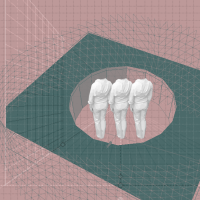The (Rent) Gap between simplicity and complexity
In the inaugural edition of Dialogues in Urban Research, PhD candidate Jelke Bosma provides a short commentary on Elvin Wyly's "The moral rent gap."

Liminal Precarity and Compromised Agency: Migrant experiences of gig work in Amsterdam, Berlin, and New York City
This chapter examines what moves migrants in the Global North to take up gig work and stick with it for various periods of time despite its by now well documented precarious conditions, by...

Review: After the Gig: How Sharing the Economy Got Hijacked and How to Win It Back by Juliet B. Schor
Niels van Doorn reviews "After the Gig: How Sharing the Economy Got Hijacked and How to Win It Back" by Juliet B. Schor.

Platform capitalism’s social contract
Niels van Doorn discusses a number of ways in which platform companies are expanding their services and influence by identifying particular societal needs and marketing themselves as efficient...

The Gentrification of Airbnb: Closing Rent Gaps Through the Professionalization of Hosting
In this article, we argue that it is analytically productive to think about the professionalization of hosting on Airbnb in terms of (commercial) gentrification. More precisely, we believe that...

Gig work as migrant work: The platformization of migration infrastructure
With markets concentrating predominantly in and around large cities, gig platforms across the globe seem to depend as much on the cheap labor of migrants and minorities as on investment capital and...

Actually Existing Platformization: Embedding Platforms in Urban Spaces through Partnerships
Published in a special issue of South Atlantic Quarterly, this paper examines the partnership as a heterogeneous boundary resource that enables platforms to generate dependencies, become locally...

Platformization in the third sector: Reframing volunteering and civil society relations as a platform transaction
In addition to platforms in paid consumer transactions, recent years have seen the rise of platforms operating in the third sector. This raises questions on how these platforms are embedded in...

Digital Care Spaces: The Particularities of a Digital Homecare Platform
Welfare state restructuring is generally accompanied by multiple forms of privatization, including the delegation of care responsibilities to both private enterprises and private (family) networks....

Odds Stacked Against Workers
This article, co-authored with Julie Chen (University of Toronto) presents a cross-national comparative study that examines how American and Chinese platform companies approach the gamification of...

Actually existing platformization: Embedding platforms in urban spaces through partnerships
In this paper, upcoming in a special issue of South Atlantic Quarterly, we examine the partnership as a heterogeneous boundary resource that enables platforms to generate dependencies, become...

Platformed professionalization: Labour, assets, and earning a livelihood through Airbnb
Based on fieldwork in Berlin, this paper tries to disentangle what 'professionalization' on Airbnb entails and who is able to take part in such processes.

Stepping Stone or Dead End? The Ambiguities of Platform-Mediated Domestic Work Under Conditions of Austerity. Comparative Landscapes of Austerity and the Gig Economy: New York and Berlin
This book chapter is part of an edited collection titled Working in the Context of Austerity: Challenges and Struggles, edited by Donna Baines and Ian Cunningham. The chapter examines how, under...

From a Wage to a Wager: Dynamic Pricing in the Gig Economy
This is a contribution to a collection of policy briefs entitled 'Platforming Equality', commissioned by Autonomy

Disrupting ‘Business as Usual’: Covid-19 and Platform Labor
This article evaluates the impacts of Covid-19 on platform-based gig work. It notes a shift in the service market towards on-demand delivery at the expense of ride hailing and domestic cleaning....

At what price? Labour politics and calculative power struggles in on-demand food delivery
This article, part of the special issue of Work Organization, Labour & Globalisation on "The Algorithm and the City", asks what can be gained by making calculability a pivotal demand for wage...

Where Data and Finance Meet: Dual Value Production in the Gig Economy
A version of this working paper will appear in the edited volume Platform Economy Puzzles: Unravelling the Gig Work Paradox, edited by Jeroen Meijerink, Giedo Jansen, and Victoria Daskalova.
The...

Migration and Migrant Labour in the Gig Economy: An Intervention
In urban gig economies around the world, platform labour is predominantly migrant labour. Yet the academic literature on the intersection of the gig economy and labour migration remains scant. Our...

Platform Capitalism’s Hidden Abode: Producing Data Assets in the Gig Economy
In this article, we argue that the governance of gig work under conditions of financialised platform capitalism is characterised by a process that we call “dual value production”: the monetary...

Is solidariteit een kwestie van digitale bemiddeling?
Article published on Sociale Vraagstukken (Dutch)
Abstract: Door de coronacrisis laten mensen digitale platforms zoals Airbnb en Uber vrijwel links liggen. Buurt- en vrijwilligersplatforms...

Weathering winner-take-all. How rankings constitute competition on webcam sex platforms, and what performers can do about it
Forthcoming in: David Stark (ed.), The Performance Complex: Competitions and Valuations in Social Life, Oxford: Oxford University Press.
Over the last decade, the global sex industry has been...

A new institution on the block: On platform urbanism and Airbnb citizenship
This article argues that Airbnb should be understood as a new urban institution that is transforming relations between market, state, and civil society actors. Taking the Airbnb Citizen advocacy...

Platform labor: on the gendered and racialized exploitation of low-income service work in the ‘on-demand’ economy
How does one value something one cannot and often does not want to see? How do contemporary digital platforms and their infrastructures of connectivity, evaluation, and surveillance affect this...







